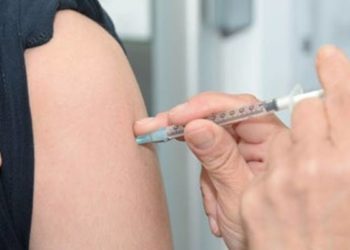Lebrikizumab effective in treating moderate-to-severe atopic dermatitis
1. In two phase three trials, 16 weeks of lebrikizumab treatment effectively treated adolescents and adults with moderate-to-severe atopic dermatitis.
2. Measures of itch and itch interference with sleep improved with lebrikizumab therapy.
Evidence Rating Level: 1 (Excellent)
Study Rundown: Atopic dermatitis is the most prevalent chronic inflammatory skin disease associated with impaired quality of life and a substantial disease burden. Consequences include sleep disturbance and severe psychosocial morbidity. First-line treatments typically include topical medicines such as topical glucocorticoids. Though, systemic therapy or phototherapy is often recommended. Lebrikizumab is a high-affinity IgG4 monoclonal antibody that selectively binds to IL-13, which is implicated as the primary cytokine in atopic dermatitis. However, there is a gap in knowledge as to understanding the efficacy and safety outcomes of lebrikizumab monotherapy for the treatment of atopic dermatitis. Overall, this study found that treatment with lebrikizumab led to significant improvement in managing the signs and symptoms of moderate-to-severe atopic dermatitis in adults and adolescents. This study was limited by an induction period of 16 weeks which restricted the evaluations of efficacy and safety of longer-term treatment. Further, monotherapy data does not always translate to the clinical setting in practice. Nevertheless, these findings are significant, as they demonstrate that lebrikizumab may be a potential treatment for managing the signs and symptoms of moderate-to-severe atopic dermatitis.
Click to read the study in NEJM
Relevant Reading: Abrocitinib versus Placebo or Dupilumab for Atopic Dermatitis
In-Depth [randomized controlled trial]: Two identically designed 52-week randomized, double-blind, placebo-controlled, parallel-group, phase three trials were conducted. Each trial comprised two treatment periods: a 16-week induction period and a 36-week maintenance period. Patients who were >18 years of age (classified as adults) or 12-18 years of age (classified as adolescents) were eligible if they had moderate-to-severe atopic dermatitis with a baseline Eczema Area and Severity Index (EASI) score of at least 16 (range, 0 to 72; with higher values indicating greater severity and extent of disease), an Investigator’s Global Assessment (IGA) score of at least 3 (range, 0 [clear skin] to 4 [severe disease]; with the score describing the overall appearance of atopic dermatitis lesions at a given time point), an affected body surface area of at least 10%, and chronic atopic dermatitis for at least one year for which topical treatment was inadequate or inadvisable. Patients with mild atopic dermatitis were excluded from the study. The primary outcome measured was an IGA score of 0 or 1 with a reduction (indicating improvement) of at least 2 points from baseline at week 16. Based on the primary analysis, the primary outcome was met in 43.1% of 283 patients in the lebrikizumab group and 12.7% of 141 patients in the placebo group in trial one (p<0.001). There was a corresponding EASI-75 response that occurred in 58.8% of the treatment group and 16.2% of the control group (p<0.001) in trial one. The primary outcome was met in 33.2% of 281 patients in the lebrikizumab group and 10.8% of 146 patients in the placebo group (p<0.001) in trial two, with a corresponding EASI-75 response that occurred in 52.1% of the treatment group and 18.1% of the control group (p<0.001). Measures of itch and itch interference with sleep also demonstrated significant responses with lebrikizumab therapy. In summary, this study demonstrates that 16 weeks of lebrikizumab was effective in adults and adolescents in treating moderate to severe atopic dermatitis.
Image: PD
©2023 2 Minute Medicine, Inc. All rights reserved. No works may be reproduced without expressed written consent from 2 Minute Medicine, Inc. Inquire about licensing here. No article should be construed as medical advice and is not intended as such by the authors or by 2 Minute Medicine, Inc.









